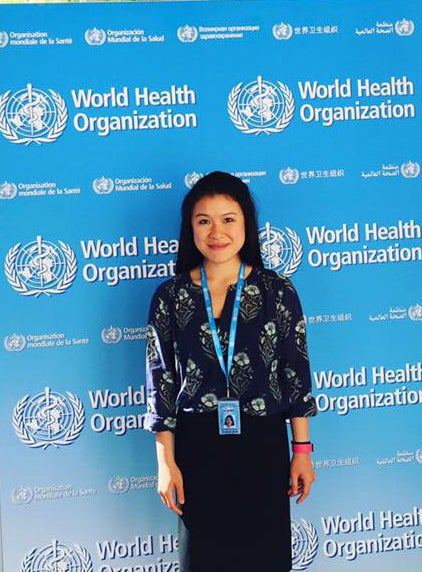Clinical Nurse Leader Student Creates Virtual Music Initiative for Senior Community Centers
April 28, 2020 – When Clarisza Runtung (G’21) read a news article about the closure of senior community centers because of the COVID-19 pandemic, she decided to combine her love of music and nursing to create virtual performances to help address loneliness.
“The goal of this music initiative is to decrease the feeling of isolation and loneliness amongst the elderly population,” she said. “I couldn’t have imagined how heartbreaking it must have been for seniors who live alone. For some of them, senior community centers are their main source of social life and community.”

To get started, Runtung emailed centers in San Francisco, where she used to live, and in New York City. Eventually, the Isaacs Center in New York provided the opportunity for her to start an online program for individuals the center serves.
With her sister, Clairine, Runtung launched “Friday Afternoon Live Music,” via Zoom, earlier this month.
‘We’re All in This Together’
“For one hour every week, two musicians perform and share snippets of their own story,” Runtung explained. “Seniors are also welcomed and encouraged to have a conversation with either the musicians or each other.”
Conversation also occurs about “how to keep going through this challenging time.”
“I started the initiative wanting to help but ended up feeling helped in return,” she said. “It made me realize that we’re all in this together.”
“We also managed to connect residents from other senior community centers in San Francisco, so it’s amazing to see people gather coast-to-coast,” Runtung said.
Staying Connected
Runtung, who earned her bachelor of fine arts degree in theater directing from the University of Michigan, has played instruments for years. “I have played piano since I was five years old, started learning the Japanese taiko drum in 2018, and am now branching out to playing a full drum set,” she said.
When she lived in San Francisco, Runtung operated a similar initiative at a nursing home for the Japanese-American community. It was during this period of Runtung’s life that her close friend passed away, causing “deep grief in which I felt isolated and alone.”
“One day, I saw a poster of a Japanese taiko group, San Francisco Taiko Dojo, when I was walking down the street in Berkeley,” she recalled. “I went to their concert and immediately felt connected with everyone in the music hall. Listening to live music, even with strangers, brought back the sense of safety, connection, and community that I thought I’d lost.”
Power of Music and Nursing
Runtung sees a power in connecting her long background in music and theatre arts with her nursing education and career aspirations.
“Having spent four years directing plays, I learned the power of music to set the atmosphere and mood of a theater,” she said. “Music can immediately create a sense of belonging and connection amongst the audience. Aren’t those the core values of nursing? I see nursing as an art and science of caring that is grounded in unity, understanding, and connection between the nurse and the patient.”
As she looks to the future, Runtung has an ambitious goal: “I would love to conduct a music therapy program in nursing homes one day. I learned that the neural networks that are associated with musical abilities are the last ones to go in dementia patients. I would love to know more about how music can increase the quality of life in elderly patients.”
Inspired by Nursing
Runtung said that Georgetown has allowed her to further explore her deep concerns about the social determinants of health that impact patients’ lives.
“[The school] embodies the values that I believe in, caring for the whole person, as well as advancing health equity and reducing social disparities through policy and advocacy,” said Runtung, who focused on this interest while working at the World Health Organization in 2016.
And she said nursing is a perfect path for her.
“I look up to nurses because they are the front-line patient advocates in health care, providing holistic care by treating patients as persons,” she said. “They look at their patient’s eyes, as well as their charts. They sit with patients and their families after diagnosis and reassure them, ‘I’m here for you.’ Nurses are interpreters and witnesses of difficult information in difficult situations.”
Runtung added: “I cannot think of a career that better suits my values and skill sets.”
Added Link June 3, 2020: See Georgetown Embraces Healing Power of Artistic Expression to Transcend Pandemic
